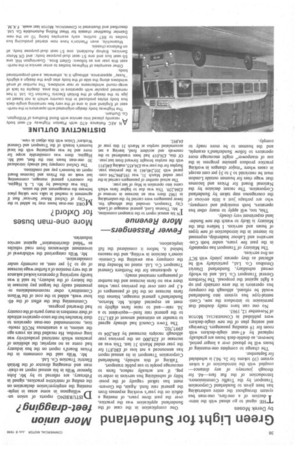Green Light for Sunderland
Page 40

If you've noticed an error in this article please click here to report it so we can fix it.
by Derek Moses THE signal to go ahead with the introduction of a one-fare, one-man bus system throughout the entire undertaking has been given to Sunderland Corporation Transport by the Traffic Commissioners. Introduction of the flat fare-4d. for through journeys of any distance— coupled with the introduction of a token system (10 tokens for 2s. 9d.) is scheduled for September.
The change to complete one-manning of buses will be phased over a longer period, however, as double-deck buses are gradually replaced by 47-seat single-deckers with room for 19 standing passengers. Drawings and seating plan of the new single-deckers were published in COMMERCIAL MOTOR of November 12, 1965.
No one can have really doubted that permission to introduce the new, Continental-type bus system into Sunderland would be refused, although the company bus operators in the area certainly put up a fight against the proposal. The Northern Gereral Transport Co. Ltd. and its wholly owned subsidiary, Sunderland District Omnibus Co. Ltd., particularly will be affected as they operate jointly with SCT on five services.
The Ministry of Transport has repeatedly in the past few years, under both Conservative and Labour leadership, expressed its interest in the introduction of new types of buses and services. 1 believe that the Ministry is lady to watch the new Sunderland experiment very closely.
This, too, will apply to many other bus operators, both municipal and company, who arc perhaps 'just a little envious of the courageous step taken by Sunderland Corporation. The recent decision by the National Board for Prices and Incomes that wage rises for busmen outside London must be restricted to 3 to 34per cent except in cases where "major changes in working practice produce genuine progress in the use of manpower" might encourage more operators to follow Sunderland's example, and the busmen to be more ready to comply.
One complication in the case of the Sunderland application was the practice, over the past three years, of meeting a deficit on the year's working expenses from the general rate fund. Again, the Government has talked vaguely of the possibility of subsidizing bus services in order to peg, if not actually reduce, fares to encourage people to use public transport.
Talking of this subsidy, Sunderland Corporation Transport in its annual report has announced a net loss of £80,871 for the year ended March 31 last. This was an increase of £28,000 on the previous year although receipts increased by £46,204 to £997,702.
The Town Council had already agreed to transfer an estimated amount of L81,732 to the general rate fund—equivalent to a 3d. rate—and to raise fares slightly to meet an expected deficit. Mr. Morton, Sunderland's general manager, blames this fares increase oil the fall of passengers of 4.3 per cent over the previous year, when there was no fares increase and the number of passengers remained steady.
A spokesman for the Northern General Transport Co. Ltd. stated on Monday that the company was awaiting the Commissioner's decision in writing, and the reasons behind it, before it considered the full implications.




























































































































